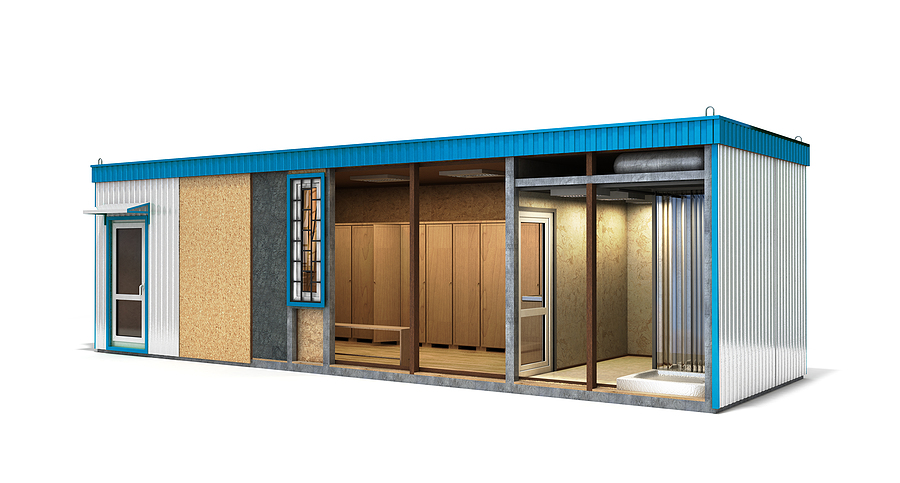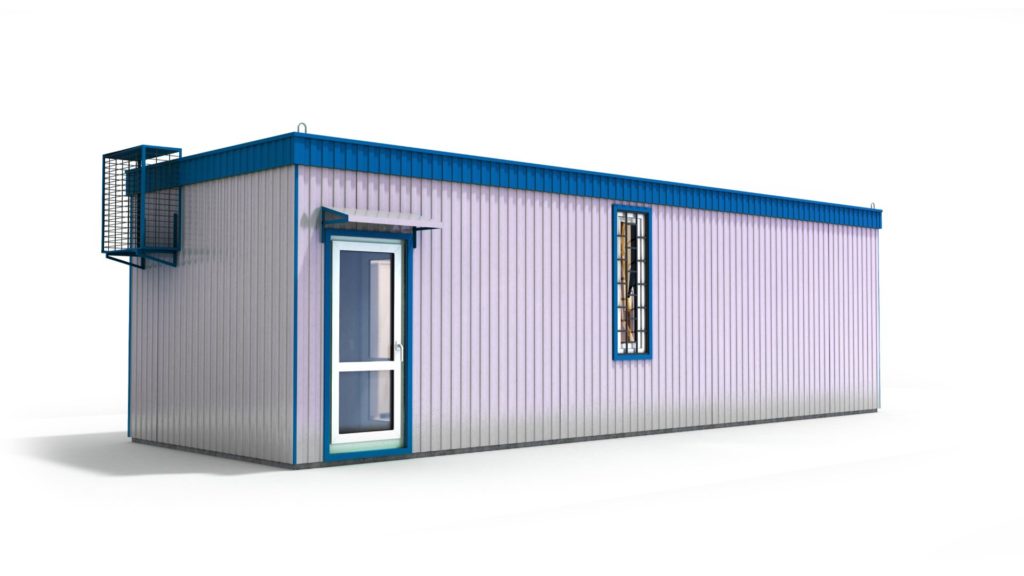
How Much Do Mobile Offices Cost to Buy?
Building under construction, or simply need a temporary work site to stay organized? Find out how much mobile offices cost to buy with this guide.
Mobile Office Buying Guide
Closing your doors to move shop is exorbitant. It costs you business hours – and the repercussions can be felt for years even if a move only takes a short space of time.

There’s a solution to a lack of space: Mobile offices.
They’re flexible, temporary solutions to a range of problems. Portable storage needs, classrooms, and modular complexes are just some of the use cases.
Discover everything you need to know – from cost to common uses, available features, and more.
What Is a Mobile Office?
Mobile offices are pre-fabricated, temporary buildings. They’re used as a temporary solution for special needs, such as workstations and storage space.
Also known as office trailers, mobile offices are portable and designed for ease of transport. They’re quick to install and often, they’re quick to source and secure a lease.
That’s their first key benefit.
Mobile Offices vs. Storage Containers
Mobile offices differ from storage containers primarily in that they’re flexible. The offices can be outfitted with storage space – or adapted as toolsheds or containers – but standard shipping containers don’t have any of the amenities or extras that mobile offices do.
Mobile offices are flexible and adaptable.
Why Use a Mobile Office?
In a nutshell, a mobile office trailer is a temporary solution to a business need.

You might use a mobile office as a transient workspace for your employees while you’re building new offices – happy employees are productive employees, and nobody likes to work in cramped conditions.
Mobile offices are portable, and many come on towable trailers that can be moved between sites with ease.
Another key benefit of the offices is that they’re fast to deploy and flexible. Sourced correctly, mobile offices can be on your doorstep in a matter of days. They can be outfitted with new systems and most mobile office suppliers offer circumstantial add-ons to suit every need.
What Options Are Available?
When searching for a mobile office for your business, you’ll have to consider any mandatory requirements (such as stairs) alongside optional extras. Options for mobile offices include any of the following:
- Size
- Storage space
- Awnings
- Restrooms
- HVAC systems
- Security add-ons
- Furniture
- Desks and workstations
- Data connections
- American Disabilities Act (ADA) add-ons
Restrooms require plumbing for installation. Most mobile offices have power requirements such as fluorescent lighting, charging stations, electrical heating, and security systems.
Single vs. Double Units
Double-wide offices are two single mobile units welded together, doubling the width. Most consist of two offices, a central common area, and a toilet.
Double-wide units tend to be cheaper per square foot than singles.
Triple Units
Triple-wide units are three offices welded together. Unlike double units, triple ones are rarely used. They’re awkward to transport because of their dimensions and are often transported as single units and welded together on-site.
This generally makes them more expensive per square foot than double units.
Which Type of Mobile Office Is Right For Me?
When selecting mobile offices, you’ll need to ask yourself three questions:
- How long do you need the space for?
- What add-ons and extras do you need?
- When will you need the space?
Leasing vs. Buying
Should you buy a mobile office or rent one?
That all comes down to how long you plan on using it. Leasing an office allows for greater flexibility because you can have it removed by its parent company at a time of your choosing. You’ll be certain the office is of high quality, and maintenance fees tend to be part and parcel of a leasing package.

What’s more, it’s far quicker to lease a mobile office than to buy or build a new one. You can have a mobile office delivered in days depending on availability, but procuring a new one – or building an extension to your business premises – takes longer.
As a general rule of thumb, leasing an office tends to work out cheaper if you plan on using it for 1-2 years.
On the other hand, if you’re looking at a timescale of 3+ years, it might make more sense to buy a mobile office outright. Three years is around the time it takes to break even on cost – and you can still sell the office to make up the deficit after the fact.
You may also wish to consider purchasing a mobile office if your business has very specific needs that aren’t catered to by leasing companies.
Buying a Mobile Office
The cost of buying a mobile office is only worth it if your business needs them for the long haul. For instance, if your business frequently needs flexible storage space – and those needs sometimes come out of nowhere – it may make more sense to buy mobile offices rather than lease them.
New single trailer units cost anywhere between $10,000 and $45,000, depending on the additional features you need to install. As we mentioned above, the cost is the rough equivalent of a three-year lease.
Mobile Office Features
Mobile office rental prices vary based on two key factors:
- The amount of space you require
- The features and addons you specify
Some features are mandatory and required by law. Others are required by businesses based on their unique needs.
Mandatory Features
Just like regular offices, mobile offices must comply with legal and OSHA health and safety regulations. These vary by state but typically include requirements such as fire alarms, accessibility for disabled persons, site-appropriate fencing, and
Some states require prior permit approval before installing mobile offices for any length of time. Always speak to a legal professional before signing a contract to avoid any legal troubles.
Optional Features
Optional features influence the final mobile office cost you pay. Often, it is cheaper to source additional amenities from your supplier than buy them yourself.
Offices, for instance, need chairs, desks, and filing cabinets. Meeting rooms might require projectors to facilitate daily briefings, while construction sites need large spaces for blueprints and planning documents.
Take the time to speak with your managerial staff and plan ahead. You’ll save more money that way.
Mobile Office Cost Breakdown
How much mobile office space do you need?
That’s the first question you have to answer. Larger trailers are more expensive. Prices vary, but in general, the cost of renting a mobile office trailer ranged from between $300 and $1500 per month, depending on size:
- Small-sized (8′ x 20′) trailers range from $300-$600 per month
- Mid-sized (10′ x 44′) trailers range from $600-$900 per month
- Large-sized (12′ x 56′) trailers range from $800-$1,000 per month
- Very large-sized (24′ x 56′) trailers range from $1,000-$1,500 per month
On top of that are delivery, setup, utility, and extra costs. Typically, delivery costs between $10 and $25 per mile, and initial setup costs between $750 and $1,500. The cost of setup hovers around one-and-a-half times the monthly rental cost.
Removal also incurs a fee, which equates to almost the same amount as the initial setup – around 80% to 90% of the cost of installation.
Industry standards and local supply and demand can influence the final fee you’re required to pay, as does the speed of deployment needed. You’ll save your business money if you book your mobile offices well in advance.
Other Cost Factors
Where you need a mobile office influences the price. The end costs associated with leasing a mobile office will vary based on local supply and demand—across the east and west coasts, demand tends to be higher, pushing prices up.
Premiums tend to rise around the spring and summer seasons, too.
A crucial factor in getting a favorable quote is the duration of the lease. If you know in advance how long you’ll require a mobile office (particularly if it’s for a year or more at a time), you may be able to negotiate a discount with a supplier.
Similarly, ordering your mobile office space months in advance will result in lower overheads.
How Are Mobile Offices Used in Industry?
Mobile offices are used across the globe in all sorts of industries. It’s a testament to their flexibility – and the cost savings involved. They’re used in the construction sector to the disaster response sector.
Governments frequently employ them for a whole range of reasons – as do private enterprises.
Construction Sector
Mobile offices are used in the construction sector in every role thinkable. They’re temporary storage, planning stations, and offices for site foremen. Every building site needs a restroom, and mobile offices supply them.
Disaster Response Sector
In the disaster response sector, mobile offices are used as planning and coordination stations, in first aid and triage roles, and to store specialist equipment needed to address a given disaster.
Their speedy deployment and versatility make them invaluable in establishing sites from which to coordinate measured responses.
Government Sector
The government makes regular use of mobile offices – whether it’s to provide temporary office space during renovations, to set up secure monitoring stations during national emergencies, or to set up voting booths during elections.
Elections, for instance, require vast – and varied – amounts of space to process differing numbers of voters based on local populations. Mobile offices suit this niche perfectly.
Healthcare Sector
The most recent example of the versatility of mobile offices was the COVID-19 pandemic. Throughout nations across the world, healthcare sectors had to respond to an unfolding crisis as fast as possible.
Mobile offices were used for mass testing stations, quarantine wards, and additional storage to house the new equipment hospitals had to have on hand to fight the virus.
Retail Sector
The retail sector can’t afford to shut doors to change warehouses or renovate crumbling buildings. Mobile offices make for great, temporary storage units to house stock nearby without requiring a large, expensive warehouse.
The Pros of Renting Mobile Offices
There’s a good reason mobile offices are so popular. The benefits outweigh the drawbacks.
Here’s a summary of what makes them the ideal solution to temporary storage needs.
Faster Installation
Acquiring a building permit, coordinating with architects, hiring a construction firm, and waiting for construction to finish takes weeks, months – or longer.
Mobile office trailers get the job done in a single day, making downtime a thing of the past.
Flexibility
We’ve covered the range of add-ons available above. But think about this: mobile offices are designed to be used on the move.
For example, a mobile team can travel around the country completing jobs with all the tools they need on hand. They’ll have storage space, office space, internet connectivity, and more with a mobile office.
And once the job is done, they can relocate in no time at all. Mobile offices allow you to prepare for contracts and deliver your services fast.
Cost
Mobile offices are cheaper than renting regular office space if it’s for the short term – and they’re a whole lot cheaper than closing your doors for business entirely.
Even across the span of a long-term installation, mobile office space can work out cheaper if you buy, rather than lease, your offices. Once the time is up, they can be resold to other businesses – or sold back to a mobile office supplier – to recuperate a portion of the installation costs.
Find a Quote Today
Mobile offices are used across every industry in the world. They’re versatile solutions to storage needs of all kinds, and their deployment can be scaled to suit anything from small businesses to vast, continent-spanning corporations.
If you’re in need of a mobile office and want to find an exact quote, we at KwoteAdvisor offer quotes in seconds. Click here for a free quote.
